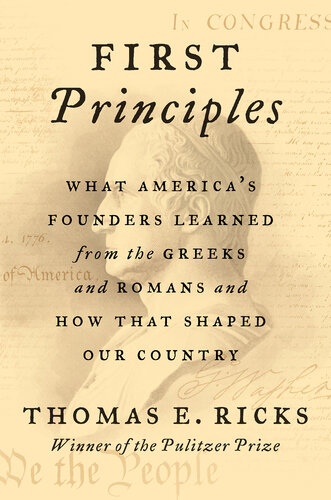
First Principles
What America's Founders Learned from the Greeks and Romans and How That Shaped Our Country
کتاب های مرتبط
- اطلاعات
- نقد و بررسی
- دیدگاه کاربران
نقد و بررسی

June 1, 2020
After the 2016 election, Pulitzer Prize-winning journalist and Pulitzer Prize finalist and No. 1 New York Times best-selling author Ricks (Fiasco) sought to understand what the Founding Fathers really had in mind. So he looked at their main reading materials, which comprised not so much the political thinkers of the era but the classics, from Xenophon and Aristotle to Cicero and the Epicureans. With a 150,000-copy first printing.
Copyright 2020 Library Journal, LLC Used with permission.

Starred review from September 21, 2020
Pulitzer Prize winner Ricks (Churchill and Orwell) delivers an immersive and enlightening look at how the classical educations of the first four U.S. presidents (George Washington, John Adams, Thomas Jefferson, and James Madison) influenced their thinking and the shape of American democracy. According to Ricks, the evolution of Washington’s military strategy during the Revolutionary War drew from Roman general Fabius’s defeat of Hannibal in 203 BCE. Ricks also documents classical antecedents in the construction of the Constitution and Thomas Jefferson’s architectural plans for government buildings in Washington, D.C., and analyzes 18th-century opinions on the ancient world expressed in Robert Dodsley’s textbook The Preceptor (“a blueprint for the Declaration of Independence”) and Joseph Addison’s play Cato (which inspired Patrick Henry’s famous line “Give me liberty—or give me death”). The Amphictyonic League, a confederation of early Greek cities, is partly responsible for the U.S. Senate’s equalized representation regardless of state size, Ricks points out. The book closes with suggested steps for returning America “to the course intended by the Revolutionary generation,” including “don’t panic,” “re-focus on the public good,” and “wake up Congress.” With incisive selections from primary sources and astute cultural and political analysis, this lucid and entertaining account is a valuable take on American history.

November 1, 2020
An exploration of the major influences of America's first four presidents. "What just happened?" That was the question that Pulitzer Prize winner Ricks--along with tens of millions of Americans--asked after the 2016 presidential election. The author also asked, "What kind of nation do we now have? Is this what was designed or intended by the nation's founders?" He proceeded to study their writings, which turned out to pay some attention to the British Constitution and French Enlightenment but more to the ancients. According to Ricks, George Washington soaked up classic Roman values of honor, self-control, and, above all, "virtue," by which the Romans "meant public-mindedness." John Adams considered himself a modern Cicero, raging against tyranny. Jefferson preferred the Greeks, a more philosophical culture but also (unlike Rome) a fractious confederation during its golden age. This may explain why he, unlike his colleagues, felt no great need for the Constitution. The scholarly Madison spent years in a methodical study of ancient political systems, enabling him to steer the Constitutional Convention through sheer expertise. Ricks admits that by the time Washington assumed office in 1789, the classical model was running out of steam. Both he and Adams raged against "faction," an evil during the Roman Republic. Jefferson was angry, as well, but proceeded to found the first political party. No one foresaw the Industrial Revolution, the arrival of democracy ("mob rule" to the Founding Fathers), or a civil war, but the U.S. adapted. However, Ricks emphasizes that the Founders' reluctance to confront slavery embedded a racism that continues to poison the American political system. The author reassures readers that the durable Constitutional order can handle a Donald Trump, and he concludes with 10 strategies for putting the nation back on course. All are admirable, although several--e.g., campaign finance reform, congressional reform, mutual tolerance--regularly fail in practice. Penetrating history with a modest dollop of optimism.
COPYRIGHT(2020) Kirkus Reviews, ALL RIGHTS RESERVED.

























دیدگاه کاربران